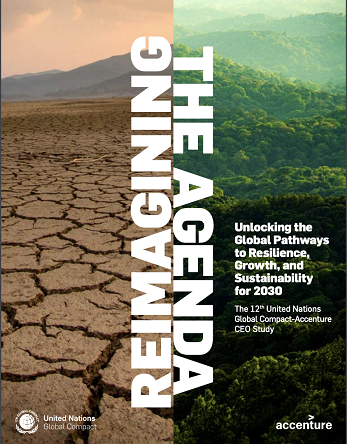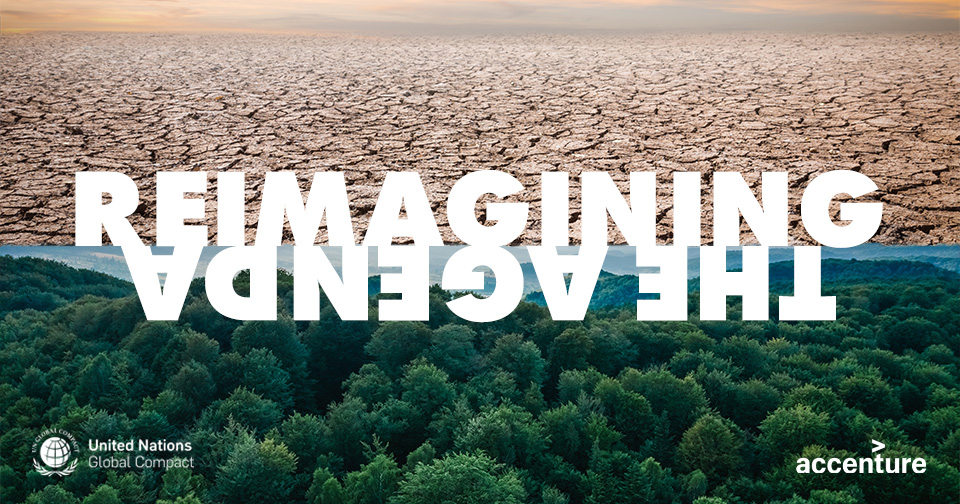CEOs are calling on governments around the world to do more to facilitate progress towards global sustainability goals, according to the latest report by the United Nations Global Compact and Accenture. Future analyzes its key takeaways
For today’s CEO, improving their company’s sustainability is an intrinsic part of the job. But many business leaders, particularly those of small and medium-sized enterprises (SMEs), say they need help from governments and other companies to implement their sustainability goals.
Launched at the World Economic Forum in January, the 12th United Nations Global Compact-Accenture CEO Study is based on the insights of 2,600 business leaders from 18 industries and 128 countries. The vast majority of them (98%) agree that it is their role to make their business more sustainable, reflecting significant growth in consensus since the 2013 survey, when 83% of CEOs agreed they were accountable for their business’s sustainability performance.
The CEO’s role has become more outward looking, not focused solely on the performance of the company but also on the way in which it interacts with the environment and the communities it impacts.
At the same time, sustainability is now seen as a business imperative – but also as an opportunity rather than a cost. Where previously there was a distinction, even a perceived conflict, between what was felt to be sustainable from a business perspective and what was environmentally sustainable, the lines between the two have become blurred. As one CEO was quoted as saying of the drive to enable fossil-free living, “that’s not a sustainability strategy; it’s a business strategy that is sustainable.”
Global risks and challenges
But whereas agreement is widespread that businesses have an important role to play in helping the world meet the United Nations’ Sustainable Development Goals (SDGs) by the target date of 2030, 87% of CEOs feel that current levels of instability limit their ability to do that. Today’s leaders face “a complex, interlinked world of risks”, ranging from geopolitical tensions and rising inflation to the pandemic and the climate crisis. These global challenges have exposed the fragility of globalized systems set up in very different times.
CEOs are overwhelmed by the sheer number of challenges they have to address. Unsurprisingly, perhaps, inflation and price volatility top the list, with only 2% of CEOs saying these were having no impact on their business.
The interconnected impacts of global challenges can be seen most clearly in supply chains, says the report. Globally, CEOs rated the increased cost of raw materials as the biggest impact on their business, followed by supply chain disruptions. Actions they are taking to build resilience in their supply chains including diversifying supply sources; embracing regionalization; and introducing redundancy or back-up capacity. A third of CEOs are also encouraging their suppliers to adopt sustainable behaviors, for example through the use of incentives.
Whereas all of these actions may once have been dismissed on the basis of cost, the disruption of the past few years has moved the focus from a purely efficiency-led model to one that places greater emphasis on resilience and sustainability. Nearly half (47%) of the CEOs surveyed said that building a responsible supply chain was part of their sustainability strategy.
Rather than causing it to be sidelined, these global challenges – particularly climate change, the pandemic and the war in Ukraine – have pushed sustainability to the top of the CEO agenda. “It is not only a climate imperative, but also the foundation for security, growth and resilience,” says the report.
Smaller businesses and developing countries need extra help
However, many SME leaders said they did not have sufficient resources or support to prioritize their commitment to sustainability. “Large corporations have a responsibility to be the first movers to adopt cutting-edge technologies to make it scalable,” said one. “They have the advantage in terms of knowledge and organizational capacity and will allow others to follow.”
SMEs are also calling on governments to provide education and financing. A majority (82%) of CEOs of SMEs feel that they need increased access to financial resources to build resilience (compared with 72% of the largest companies), while 85% feel they need educational resources on business resilience (compared with 78%).
Businesses of all sizes are concerned that net-zero commitments made by governments, for example at the UN Climate Change Conferences, are not being followed up by action. To date, more than 70 countries have pledged to reach net zero emissions, but few have solidified nationally determined contributions that are ambitious enough to keep global warming to the target limit of 1.5°C above pre-industrial levels (according to the Paris Agreement, 2015).
CEOs are calling on policymakers to deliver on this promise and on the COP26 pledge (2021) to double investment in adaptation financing – funding to help safeguard developing countries against the impacts of climate change.
Businesses in the developing world are also more likely to lack access to finance to help them grow a resilient business, with 34% of CEOs considering the lack of financial resources a barrier, compared with just 18% of CEOs in developed countries.
Demand for a level playing field
An overriding theme is the need for a level playing field in which every company in every country can play its part in building a truly sustainable future. Policymakers can achieve this, say the CEOs, by establishing sustainability reporting frameworks, standards for transboundary movement, and a global carbon price, for example.
Governments are also being urged to develop a global biodiversity framework that sets ambitious targets to halt biodiversity loss. Despite its importance, biodiversity continues to be overlooked on the CEO agenda. Only 18% of the leaders surveyed said it was a priority for them, making it the lowest ranked of all the sustainability challenges CEOs were addressing. This may be due to uncertainty around the business case for biodiversity, and how to measure its impacts – further government regulation is needed, says the report.
As with many of the building blocks of resilience, the key to making meaningful progress will be collaboration: between the public and private sectors, governing organizations and NGOs; even between competitors. Despite the many complex challenges and soaring levels of uncertainty, a significant majority (92%) of CEOs still feel that the world will be able to achieve the Sustainable Development Goals (SDGs) by 2030. This latest CEO Study makes clear that businesses across the world, and across all sectors, are ready to take the necessary action.
Further details:
Download the 12th United Nations Global Compact – Accenture CEO Study, here.







